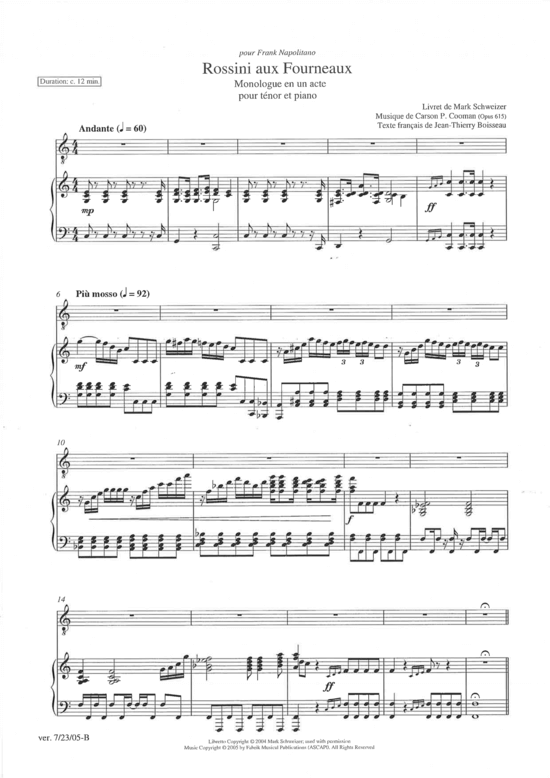Rossini aux Fourneaux (Tenor + Klavier) - Sheet Music Download PDF
Carson P. Cooman

Rossini aux Fourneaux (Tenor + Klavier) - Sheet Music Download PDF
Carson P. Cooman
Test Print Sheet Music
Details
| Product number: | MFCC023FR pdf |
|---|---|
| Arrangement: | Duet |
| Instruments: | Piano, Vocal |
| Genre: | Klassik |
| Era: | Contemporary |
| Duet: | Piano, Voice |
| Vocal: | Gesang Tenor |
| Authors: | Cooman, Carson P. (1982-*) |
| Pages: | 18 |
| Publisher: | Musik Fabrik Music Publishing |
The lyrics are in French
Rossini in the Kitchen (2005) is a comic staged monodrama for tenor and piano. It wascomposed for and is dedicated to Frank Napolitano.
The work imagines the Italian composer Gioacchino Rossini (1792-1868) in his later years inParis. After his rather young retirement at age 37, Rossini wrote no more opera and insteadled a life of leisure and luxury, pursuing his great love of gourmet cooking.
Although Rossini was from the northernmost regions of Italy, known for their elegant Frenchinfluencedcuisine, the recipes in this work are familiar "Tuscan style" Italian fare. It isassumed that Rossini would perhaps have enjoyed these dishes as well and made them as anod to his native country, whose national musical style he had so impacted with hiscompositional work.
The musical language of this work is ecletic, drawing upon the common practice language ofRossini's time, distorted and amplified through more contemporary sounds and textures.Some of the contemporary sounds and textures are derived from popular music traditions ofthe second half of the 20th century. Since, like more modern popular music, Rossini's ownwork was some of the most popular and widely known music of its time. His tunes werewhistled by people in the streets, in the same way that today's pop songs are.
Thus, the musical language of the work sometimes switches abruptly or transforms from onestyle into another. There are numerous allusions to Rossini's own music as well as that ofother later opera composers who were indebted to him.
PERFORMANCE NOTES: The work should be staged simply, with the tenor dressed in
chef's garb entering during the overture and performing all the stated actions using props on a
table. The tables serves as both the cooking preparation surface and a "pretend" stovetop. A
separate stove could also be constructed out of a cardboard box. The ingredients (food props,
bottles of wine, etc.) should be obtained as best as possible so as to make the drama
convincing.
Any passages marked recitativo, molto rubato should be sung in the manner of traditional
recitative -- extremely freely based on speech rhythms. The rhythms notated are only an
approximation for convenience and should not be sung metronomically. Note, however, that
the music of these sections, while sometimes resembling "traditional" recitative has plenty of
melodic and harmonic surprises.
Login

 Payment methods
Payment methods











































